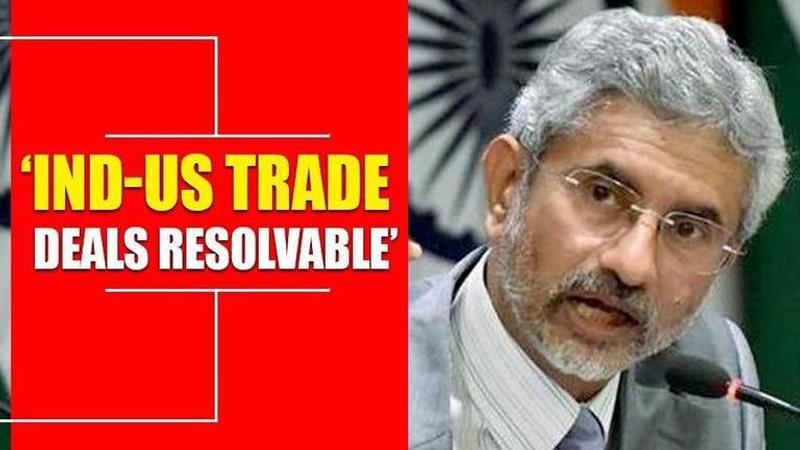Published 21:21 IST, September 30th 2019
S Jaishankar: Most India-US trade deals are resolvable
External Affairs Minister S Jaishankar on Monday said most of the trade disputes between India and the US are 'resolvable in the near term'

External Affairs Minister S Jaishankar on Monday said most of the trade disputes between India and the US are 'resolvable in the near term', as he ruled out pushing the issue for the next American administration. In an event organised by the Carnegie Endowment for International Relationship think-tank, Jaishankar said the foreign policy and priorities of the Modi government is in tune with the realities of a New India, which is currently the fifth-largest global economy and is soon going to be the third-largest. "Most of the trade disputes (with the US) are resolvable in the near term," Jaishankar told the audience in his first engagement of his maiden trip to the US capital as External Affairs Minister. He said the Modi government wants to resolve the Indo-US bilateral trade issue as early as possible and does not want to push it for the next administration in the US. "Today we approach the world with a high degree of realism and a strong sense of belief," he said.
India-US negotiating a trade package
The US Presidential election is scheduled to take place in November 2020. India and the US are negotiating a trade package to iron out bilateral trade issues and promote two-way commerce. India is demanding exemption from high duties imposed by the US on certain steel and aluminum products, resumption of export benefits to certain domestic products under their Generalised System of Preferences (GSP), greater market access for its products from sectors, including agriculture, automobile, auto components and engineering. On the other hand the US wants greater market access for its farm and manufacturing products, dairy items and medical devices, and cut on import duties on some ICT products. The US has also raised concerns over high trade deficit with India. In 2018-19, India's exports to the US stood at USD 52.4 billion, while imports were USD 35.5 billion. Trade deficit dipped from USD 21.3 billion in 2017-18 to USD 16.9 billion in 2018-19. India received FDI worth USD 3.13 billion from the US in 2018-19, higher than USD 2 billion in 2017-18. Jaishankar said some of the backbones of the bilateral ties are the knowledge economy, which is growing deeper, and the diaspora connect, which has become stronger both in terms of number and quality.
Modi 2.0: Neighborhood first policy
Asserting that Modi 2.0 would continue with its neighborhood first policy, he said Bangladesh has emerged as the role model of that under which India has moved forward aggressively in helping its neighbors in their economic development, in particular, infrastructure, connectivity and resolving long-pending disputes. Responding to a question on the media coverage of Kashmir post-August 5, when the Indian government revoked Jammu and Kashmir's special status, the minister said it is almost impossible to find anywhere in the global media that the Article 370 was a temporary provision. This is because he rued, it is not convenient to the story the western media is pushing. "I would not lose my sleep," he said on the negative coverage of the Kashmir issue by the western press. "Everything that the liberal press think is good for the world was not happening in Jammu and Kashmir," Jaishankar said, explaining in detail as to how crucial issues like right to work, right to education and those related to women, children and reservations were not being implemented in Jammu and Kashmir because of Article 370, which was a temporary provision.
Somebody had to take a call on the constitutional provision and that call has been taken by the present government, he said, adding that the problem with Article 370 was that there was a state and as India progressed, it became less and less aligned with the rest of the nation. During his three-day trip to Washington, the minister is scheduled to meet his US counterpart Secretary of State Mike Pompeo, US Defence Secretary Mark Esper, and the new National Security Advisor Robert O'Brien. He is also scheduled to meet a host of US lawmakers and interact with the think-tank community.
Updated 22:00 IST, September 30th 2019




